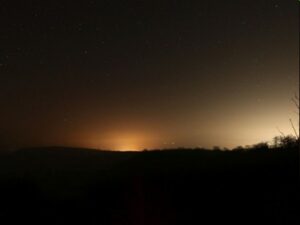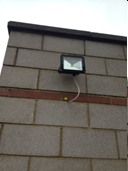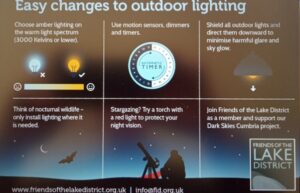LED technology has transformed lighting’s energy efficiency, supporting the need to reduce our carbon footprint and electricity consumption. Poor lighting though has some major negatives:
- The cool white colour temperatures of many of the cheaper LED lights, mimicking daylight throughout the night, is highly harmful to wildlife. It stops animals, like songbirds sleeping properly overnight, prevents sensitive species like Frogs and Toads from breeding, stops larger Bats (like the Brown Long-Eared) from coming out of their roosts to feed. Wildlife has evolved with the daily day-night cycle over hundreds of thousands of years; darkness is essential to their health and well-being.
- Because of the way LED lights work, when badly fitted, any light directed across the horizontal is throwing 50% of it up into the sky. This contributes to ‘sky glow’ stopping many of us seeing more stars, whether the Milky Way or Northern lights. Really this is wasteful casting light upward into the sky – its the road, pavement or path surface people drive, walk or cycle on, where light is needed. Recent research shows that across the Earth we are brightening our night skies with artificial lighting by around 10% each year.(1) Not great when you consider that the light from distant stars takes millions of years to reach us, only to be snuffed out in the dying seconds!


Lighting the night sky (above left), with poorly fitting LED lights (above right).
- With the low cost of many readily available LED lights, often you see them being installed where they don’t fulfil a real need, install far too many onto buildings and outside spaces, or leave them on all night. Again a wasteful use of electricity. Its thought that globally about 16% of all electricity consumption goes on lighting, and this is rising as population grows and more and more lighting is being installed. So ironically LEDs are more efficient, but we’re not reducing energy use overall! With last year’s energy price rises, a survey of England’s County Councils, showed their streetlight electricity bills had risen by £60 million.
The good news here in Cumbria there is a ‘Dark Skies Project’, led by Friends of the Lake District (CPRE, The Countryside Charity for Cumbria), in collaboration with the local authorities and lots of organisations, local and national. The name ‘Dark Skies’ doesn’t mean switching off all our lights! Rather to use the Right Light, in the Right Place and at the Right Time. Good lighting that is well fitted does not compromise on security or make us feel less safe after dark.
Here are a few simple tips to follow to help tackle the potential negative impacts when thinking of whether to install new lighting at home or at your business:

The Dark Skies Cumbria Project is doing lots of good work, please have a look: Dark Skies Blog | Friends of the Lake District
(1). https://www.nhm.ac.uk/discover/news/2023/january/increasing-light-pollution-drowning-out-stars.html
Jack Ellerby
Dark Skies Officer
Friends of the Lake District